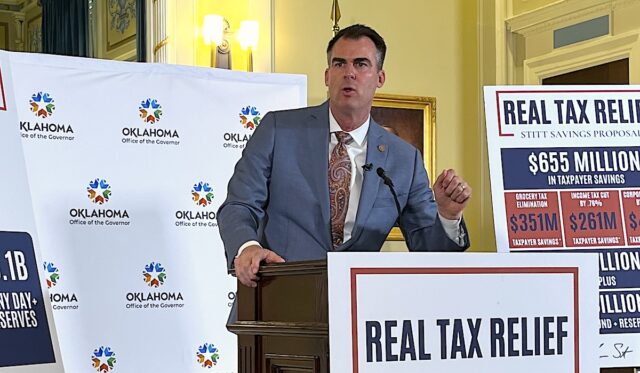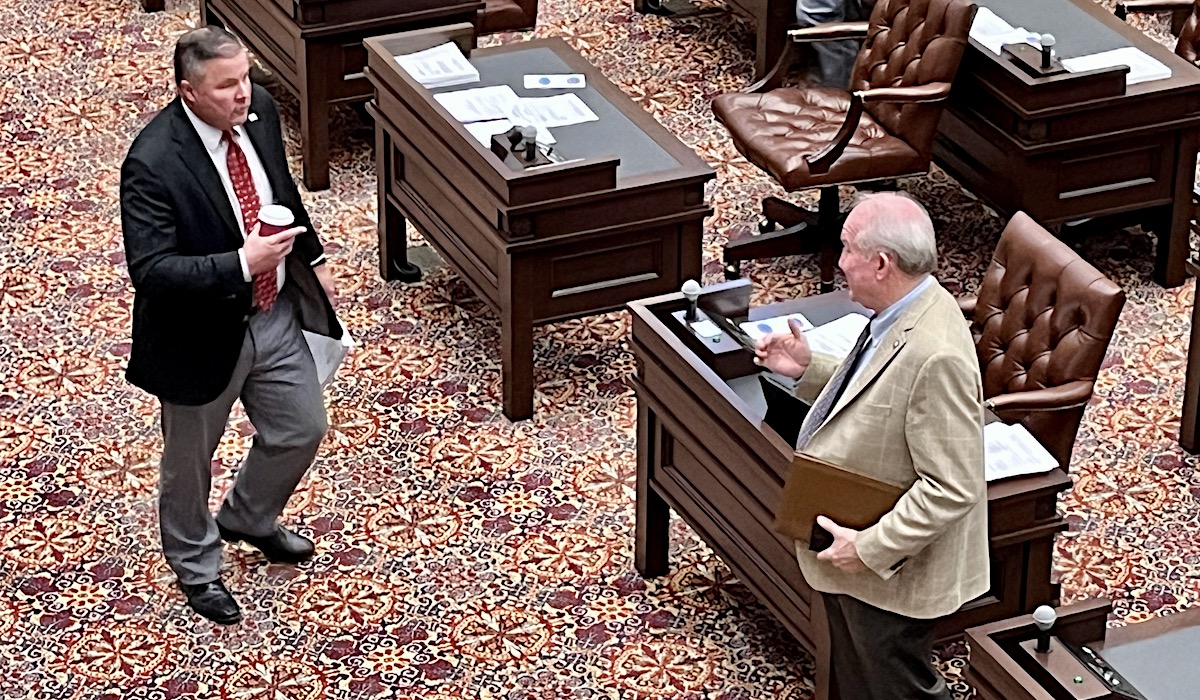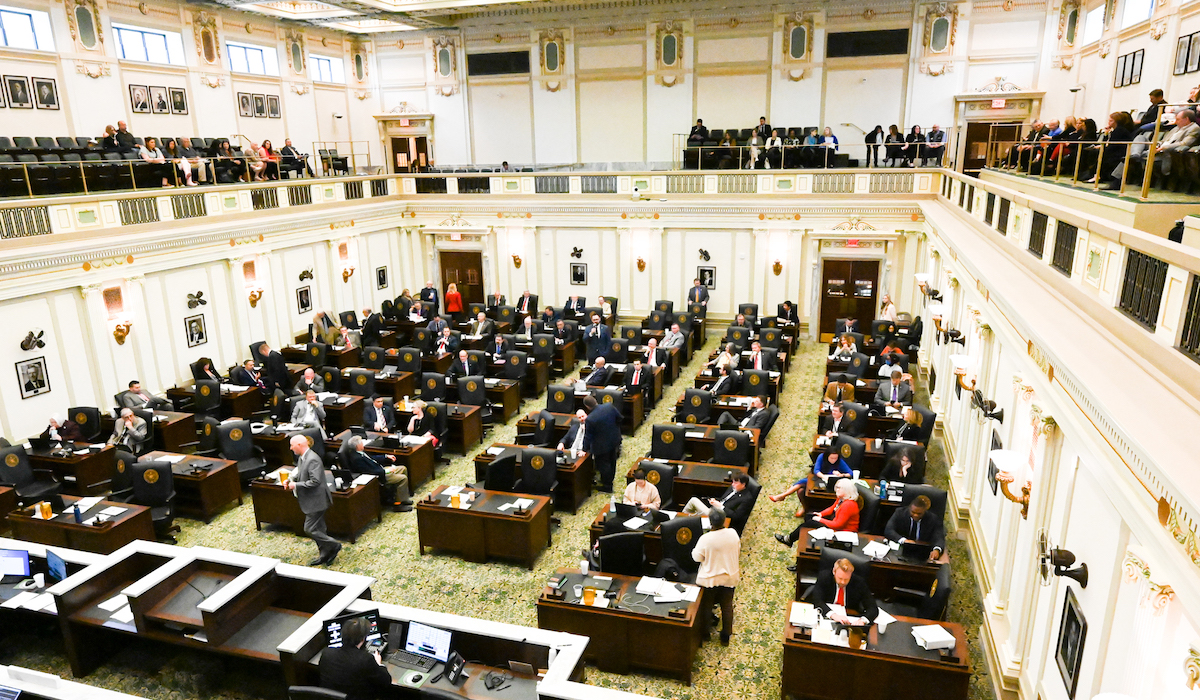

(Update: After the publication of this article, the Oklahoma State Senate reconvened shortly before 4 p.m. Thursday, April 27, and amended a series of House bills to advance new versions of their education-package priorities. The bills include a staggered teacher pay raise and school funding bill with a $500 million price tag, HB 2672, a school choice tax credit bill with higher amounts dedicated to lower-income families, HB 1934, a paid teacher maternity leave bill, HB 2180, a $10 million literacy program bill, HB 2679, and a teacher mentorship stipend bill, HB 1936. The Senate’s revised package uncoupled the school funding and the tax credit bills. The following article remains in its original form.)
In an air raid aimed at the Oklahoma Legislature’s upper chamber, Gov. Kevin Stitt vetoed 20 Senate bills late Wednesday evening with identical veto messages that said he “will continue to veto any and all legislation authored by senators who have not stood with the people of Oklahoma and supported this plan.” He had vetoed three Senate bills earlier in the day, and he also axed five House bills.
“Oklahomans elected me to advocate on their behalf and fight for the taxpayer,” Stitt wrote about 20 bills authored by 15 different senators. “I take this responsibility seriously and so I cannot, in good faith, allow another year to go by without cutting taxes and reforming education, both of which we can absolutely afford.”
Stitt’s veto message on the Senate bills — which included a U.S. Department of Defense request measure and the University of Oklahoma’s request on name, image and likeness policy — caught the attention of legislators late Wednesday, spurring group chats and cross-chamber communications among rank-and-file members who have not directly participated in contentious and so-far fruitless negotiations about a proposed education package.
“Until the people of Oklahoma have a tax cut, until every teacher in the state gets the pay raise they deserve, until parents get a tax credit to send their child to the school of their choice, I am vetoing this unrelated policy and will continue to veto any and all legislation authored by senators who have not stood with the people of Oklahoma and supported this plan,” Stitt concluded his veto message on the Senate bills.
But Stitt also axed five House bills late Wednesday, including HB 2863‘s significant proposal to establish an Oklahoma State University Veterinary Medical Authority. In his veto message, Stitt questioned the new body’s proposed bonding capacity.
“As a champion of government efficiency, I wholeheartedly support the effective and efficient administration of government and quasigovernment programs,” Stitt wrote. “However, among the many powers and duties the bill gives to the Authority is the power to make and issue bonds up to $50,000,000.00. Even for a good cause, I cannot allow the taxpaying public to foot the Authority’s bill, especially where there is little to no oversight, as is the case here.”
A cattle rancher by trade, Rep. John Pfeiffer said the OSU Veterinary Medical Authority bill needs to become law, but he noted the House’s frustration with the Senate as well.
“I think the OSU VMA is really good policy and the vet school desperately needs it,” said Pfeiffer (R-Orlando). “But the Senate is going to have to be reasonable and come to an agreement on education.”
In a move that also surprised onlookers, Stitt also vetoed HB 2820, which would recreate the Oklahoma Education Television Authority. In his veto message, Stitt questioned the function of the public television network.
“The OETA oversees the provision of educational television systems and services provided by and through various educational and cultural agencies,” Stitt wrote. “Although the OETA may have played a principal role in the provision of educational television services at one time, today the OETA’s long-term, strategic value is at best unclear, if not outright imagined.”
‘I’ve never seen anything like it’

Thursday morning in a fourth-floor Senate hallway, senators were drinking coffee, printing out veto statements and mentally preparing to hear about four dozen bills as the week’s floor deadline for policy measures approached by the minute.
“The war has started,” one Republican senator said with a laugh as he entered the hall.
From a nearby office, another senator quipped: “I thought the war started two months ago when the House sent those two bills over.”
Indeed, the dysfunction and consternation plaguing Oklahoma’s 2023 legislative session stemmed from House Speaker Charles McCall (R-Atoka) suddenly revealing and sending over to the Senate a major education funding and reform package. McCall told senators that his proposal — one bill for new funding and another for new school choice tax credits — must not be amended.
In a state full of citizens who typically loathe being told what they can and can’t do, the Senate disregarded McCall’s demand and sent their own versions of the bills back to the House.
One thing led to another, and Stitt — fresh off a reelection he has framed as a mandate for school choice and tax cuts — busted out a barrel of ink for his infamous veto pen and started blowing bills apart Wednesday.
“I’ve never seen anything like it,” said Sen. Blake Stephens (R-Tahlequah). “I love the governor. I love his heart. I know what he is trying to do, and we are trying to do the same things, but you only have so much money in the piggy bank.”
Stephens noted a line in Stitt’s veto message that many Capitol insiders considered disingenuous. In arguing that lawmakers should pass the massive education proposal and a tax cut, Stitt said the state “can absolutely afford (it) with our $1.2 billion surplus and over $6 billion in savings.”
RELATED
Of children and donuts: House sends Stitt proposal to Senate where it ‘isn’t going to pass’ by Tres Savage
Stitt has claimed state coffers feature more than $6 billion in savings previously, most notably while standing in front of fancy charts that displayed a confusing and non-annualized array of tax-cut price tags. Asked by media how he had arrived at $6 billion in purported savings, the governor referenced state savings accounts and additional pots of money, including Medicaid surpluses and the nearly $700 million Stitt would like to dedicate to land a Panasonic battery plant.
Thursday morning, Stephens said Stitt’s claim of $6 billion in savings is a misrepresentation of the funding situation.
“We don’t have that kind of money. With everything that is going on and everything that is allocated this session, we don’t have that $6 billion,” Stephens said. “It’s misleading the public as to what we’re sitting on, to me. And I love the governor, I love his heart, and I’m one of his biggest fans. But I’ve never seen anything like the way this is coming down.”
Other senators were more reserved early Thursday. Sen. Casey Murdock (R-Felt), Sen. Dewayne Pemberton (R-Muskogee) and Sen. Tom Dugger (R-Stillwater) sipped coffee in Murdock’s office and mostly stopped themselves from revealing their true feelings about Stitt’s 20 Senate bill vetoes.
“Nobody’s ever happy when the governor vetoes your bills,” Murdock said, his large boot-clad feet propped on his desk.
Pemberton sat upright and offered a similar assessment.
“I’m never happy when politics trumps policy, and that’s all this is,” he said. “It’s all politics.”
Down the hall, Sen. John Haste (R-Broken Arrow) said he was “not totally surprised” by Stitt’s hydrogen blast.
“Well, each body has their own — as the term is used — their own nuke button, and we’re at that time of session,” Haste said.
Around the corner, Sen. David Bullard (R-Durant) also seemed unfazed.
“There are four weeks left. That’s an eternity in this building. There’s time to get something done,” Bullard said. “Every year we deal with the back and forth. That’s a bicameral legislative republic, so that is the process and that is what we’re going to work with.”
But Stephens, who noted that he is only in his third regular session, emphasized the “convoluted” nature of the ongoing education negotiation.
“Last night, I was at the OCPA banquet. The governor spoke and Superintendent (Ryan) Walters spoke, and they’re talking about parent choice. Man, where I come from there ain’t choice. You’ve got public schools. You don’t have private schools sitting on every other corner. That’s an issue,” Stephens said. “They say, ‘Yeah, well it opens up a free market.’ Well, I’m all for free markets, but I’m not seeing anybody coming out and building brick-and-mortar schools for our kids in rural Oklahoma.”
Still, Stephens said he wants “a deal made,” particularly to provide a larger teacher pay raise than the $2,000 to $5,000 stair-stepped plan pitched by Stitt and advanced Wednesday by the House.
“We can’t afford not to do the right thing — and I’m talking specifically about teachers right now. We have got to get that done,” Stephens said. “It’s a very creative thing the speaker sent over. I guess you could say it was a starting point, but I liked the Senate bills much better.”
McCall: ‘Let’s quit dancing around’

Late Thursday morning, McCall gathered media in his office to discuss Stitt’s veto decisions and reiterate his frustration with the Senate’s rejection of the governor’s proposed compromise package., which would dedicate $600 million of new funding to public schools and up to $200 million for new refundable tax credits for the families of homeschool and private school students.
“I don’t understand why the Senate is having a hard time passing something that is great for everybody. It’s certainly not a plan that we love. We know that they don’t love the plan either, but the plan makes sense, and the plan is good for Oklahoma regardless of our personal feelings and the competitive nature that every legislator has,” McCall said. “We’re all class presidents in here. There is a competitive nature to what we do. You want to fight for your district, you want to fight for your [chamber]. But there are some issues that transcend all of that. And education transcends everything.”
McCall said his counterpart, Senate President Pro Tempore Greg Treat (R-OKC) should put Stitt’s proposed compromise plan up for a vote on the Senate floor.
“I understand why the governor is vetoing the bills. The governor has certain power under the constitution, and he is making it very clear — and he has conveyed it to me personally that if we get the compromise plan to his desk, he’s going to be fine with any overrides,” McCall said. “I fully understand why the governor is doing what he is doing. I don’t think anybody in this building is surprised by that, and there is a path to restore everything. But once again, the Senate has not put up the House’s plan or the governor’s plan for a vote. Take the vote. That’s what you need to do. Let’s quit dancing around.”
Treat, however, has emphasized that one portion of the House and governor’s plans is particularly unpalatable: the $300 million so-called Oklahoma Student Fund, which intentionally favors rural school districts with a significant portion of the proposed new appropriations.
“The ‘Student Fund’ is very objectionable to my caucus,” Treat said Wednesday. “We have already communicated to the House and governor that this isn’t going to pass in the Senate. They are playing games and giving false hope.”
McCall defended the Oklahoma Student Fund’s cap on funds for larger school districts.
“To me it’s come down to — well I don’t understand. It’s constitutional. There’s no problem with it. We’ve had attorneys look at it. There’s no problem with it. Why do you care? Put more money in the formula if you feel like the larger schools have too much of a haircut. We’re fine with that,” McCall said. “The governor’s plan has more money in the formula. The House just keeps saying, ‘Yes.’ But for the school choice piece, there has to be an exchange — something of value for the rural members of the Legislature and those schools for the tax credit, which is going to be much more heavily utilized in the metro areas. That’s how you get consensus.”
Follow @NonDocMedia on:
Gov. Stitt’s veto hits
The Legislature can override any gubernatorial veto by voting with super-majority support in each chamber for a bill to become law despite the objection of the governor.
Veto overrides must begin in a bill’s chamber of origin and must receive two-thirds support from each chamber. A bill featuring an emergency clause must receive three-fourths support.
The following bills were vetoed by Stitt on Wednesday:
- SB 34 would modify provisions regarding youth access to tobacco handled by the Alcohol Beverage Law Enforcement Commission’s tobacco;
- SB 58 would extend the Board of Governors of the Licensed Architects, Landscape Architects and Registered Commercial Interior Designers of Oklahoma until 2026;
- SB 60 would extend the Board of Chiropractic Examiners until 2026;
- SB 123 would modify guidelines related to the parole process;
- SB 125 would modify meeting requirements for the Board of Law Library Trustees;
- SB 162 would extend the State Board of Examiners of Psychologists until 2026;
- SB 249 would broaden an exemption for electronic pharmaceutical prescriptions;
- SB 267 would modify membership of the Advancement of Wellness Advisory Council;
- SB 291 would allow victims of child abuse to apply for an emergency temporary order or emergency ex parte order for protective orders;
- SB 369 would prohibit long-term care facilities from hiring nurse aides who have registered as a sex offender;
- SB 395 would allow Oklahomans to make a donation on their income tax form to support disaster response;
- SB 479 would modify a definition related to veterans;
- SB 534 would change the eligibility income cap for families to qualify for disability services from $45,000 per year to 300 percent of the federal poverty level;
- SB 617 would clarify the venue for legal action to take place against LLCs to be the relevant county in which the matter arose;
- SB 623 would amend state statute to bring aspects of the Department of Public Safety under Service Oklahoma;
- SB 711 would direct jails to take steps to prevent or stop opioid overdoses;
- SB 712 would direct hospitals to take steps to prevent or stop opioid overdoses;
- SB 840 would amend the state’s collegiate athletics name, image and likeness (NIL) guidelines.
- SB 841 would amend state statute regarding towing laws;
- SB 889 would expand the scope and amount of fees related to milk production;
- HB 2661 would modify leave benefits under the Oklahoma Personnel Act;
- HB 2608 would modify definitions related to the Sex Offenders Registration Act;
- HB 2819 would recreate the Oklahoma Advisory Council on Indian Education.





















